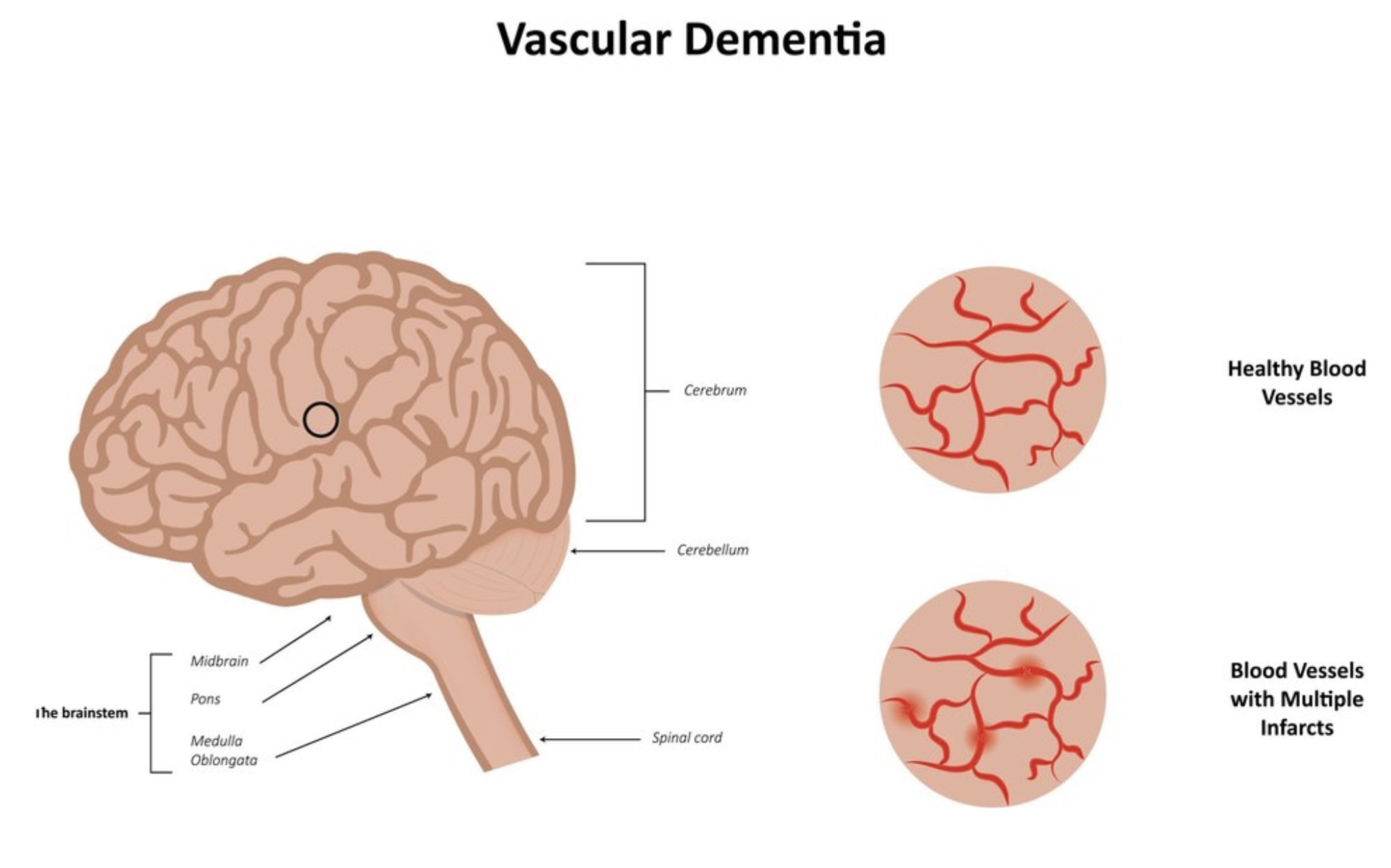Vascular Dementia: Symptoms, Causes, Treatment
What are the symptoms of vascular dementia?
Vascular dementia is a type of dementia that occurs when there is reduced blood flow to the brain, depriving brain cells of the oxygen and nutrients they need to function properly. The symptoms of vascular dementia can vary depending on the underlying cause and the areas of the brain affected, but common symptoms include:
- Memory loss: People with vascular dementia may experience memory loss, particularly in the form of difficulty recalling recent events or conversations.
- Difficulty with planning and organization: Vascular dementia can affect a person’s ability to plan and organize tasks, leading to difficulties in following through with daily activities or tasks.
- Difficulty with attention and concentration: Vascular dementia can cause problems with attention and concentration, making it difficult to focus on tasks or conversations.
- Impaired judgment: People with vascular dementia may exhibit poor judgment or decision-making abilities, leading to risky or inappropriate behavior.
- Mood changes: Vascular dementia can cause changes in mood, including depression, apathy, or irritability.
- Difficulty with language: Some people with vascular dementia may have trouble finding the right words or understanding spoken or written language.
- Confusion and disorientation: Vascular dementia can cause confusion and disorientation, particularly in unfamiliar or complex situations.
- Difficulty with motor skills: In some cases, vascular dementia can affect a person’s coordination and motor skills, leading to difficulties with walking or other physical tasks.
The symptoms of vascular dementia can vary widely from person to person and may worsen over time. It’s important to see a healthcare provider for a proper diagnosis and to discuss treatment options if you or a loved one are experiencing symptoms of vascular dementia.
What are the causes of vascular dementia?
Vascular dementia is caused by reduced blood flow to the brain, which can damage or kill brain cells. This reduced blood flow can be caused by a variety of factors, including:
- Stroke: The most common cause of vascular dementia is stroke, which occurs when the blood supply to a part of the brain is interrupted or reduced, depriving brain cells of oxygen and nutrients.
- Small vessel disease: Damage to the small blood vessels in the brain can lead to reduced blood flow and damage to brain cells, contributing to the development of vascular dementia.
- Atherosclerosis: Atherosclerosis, or the buildup of plaque in the arteries, can restrict blood flow to the brain and increase the risk of vascular dementia.
- High blood pressure: Chronic high blood pressure can damage blood vessels in the brain, increasing the risk of vascular dementia.
- Diabetes: Diabetes can damage blood vessels throughout the body, including those in the brain, increasing the risk of vascular dementia.
- Smoking: Smoking can damage blood vessels and increase the risk of atherosclerosis, contributing to the development of vascular dementia.
- High cholesterol: High levels of cholesterol can contribute to the buildup of plaque in the arteries, increasing the risk of vascular dementia.
- Other cardiovascular risk factors: Other factors that increase the risk of cardiovascular disease, such as obesity, lack of physical activity, and unhealthy diet, can also increase the risk of vascular dementia.
It’s important to manage and treat these risk factors to reduce the risk of developing vascular dementia. Making lifestyle changes, such as eating a healthy diet, exercising regularly, not smoking, and managing conditions like high blood pressure and diabetes, can help reduce the risk of vascular dementia.
What is the treatment for vascular dementia?
The treatment for vascular dementia focuses on managing symptoms, slowing the progression of the disease, and addressing underlying conditions that may contribute to the development of vascular dementia. Treatment may include a combination of medications, lifestyle changes, and supportive therapies. Here are some common approaches to treating vascular dementia:
- Medications:
- Cholinesterase inhibitors: These medications, such as donepezil, rivastigmine, and galantamine, are often prescribed to help improve cognitive symptoms and manage behavior changes in people with vascular dementia.
- Memantine: This medication may be prescribed to help manage symptoms of moderate to severe vascular dementia.
- Blood pressure medications: Controlling high blood pressure is important in managing vascular dementia, and medications may be prescribed to help lower blood pressure.
- Lifestyle changes:
- Healthy diet: Eating a balanced diet rich in fruits, vegetables, whole grains, and lean proteins can help support brain health.
- Regular exercise: Physical activity can help improve circulation and overall health, which may benefit vascular dementia.
- Smoking cessation: Quitting smoking can help reduce the risk of further damage to blood vessels in the brain.
- Limiting alcohol intake: Excessive alcohol consumption can contribute to cognitive decline and should be avoided.
- Management of underlying conditions:
- Managing conditions such as diabetes, high cholesterol, and heart disease can help reduce the risk of further damage to blood vessels in the brain.
- Controlling blood sugar levels: Keeping blood sugar levels within a healthy range is important for people with diabetes, as high blood sugar can contribute to cognitive decline.
- Supportive therapies:
- Occupational therapy: This can help people with vascular dementia learn strategies to manage daily tasks and maintain independence.
- Speech therapy: Speech therapy can help improve communication skills in people with vascular dementia.
- Cognitive rehabilitation: This type of therapy focuses on improving cognitive function through exercises and strategies.
- Psychological support:
- Counseling or therapy can help people with vascular dementia and their families cope with the emotional challenges of the disease.
It’s important for individuals with vascular dementia to work closely with a healthcare team to develop a treatment plan tailored to their specific needs and symptoms. Regular monitoring and adjustments to the treatment plan may be necessary as the disease progresses.




